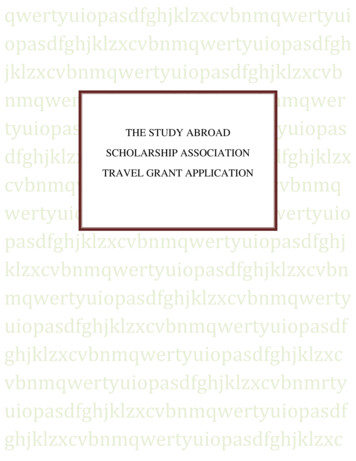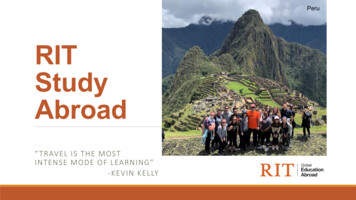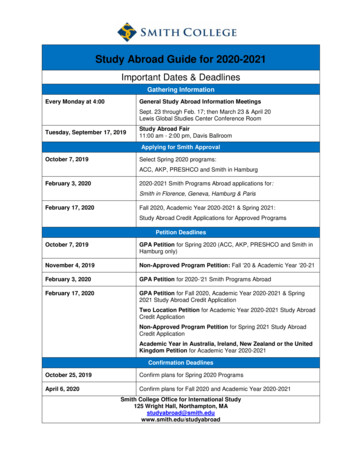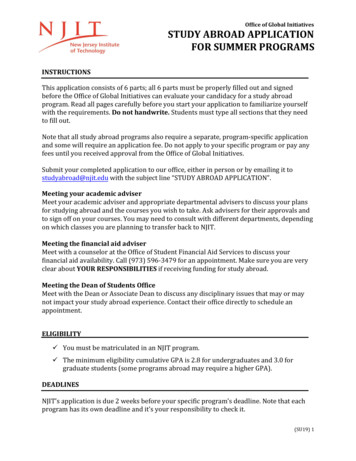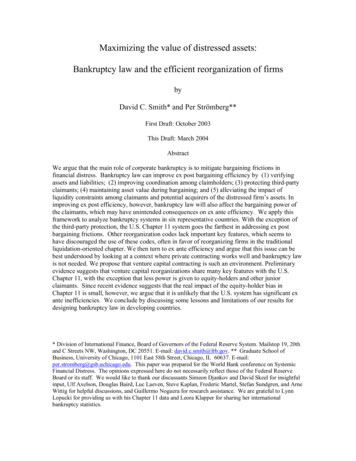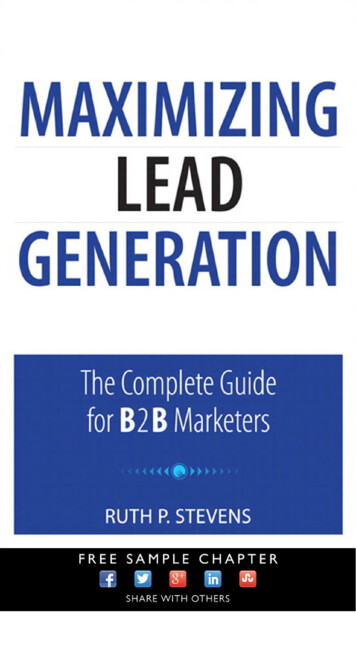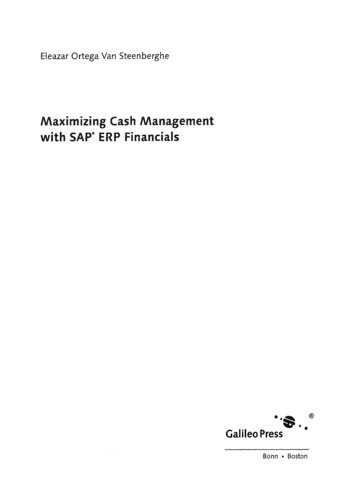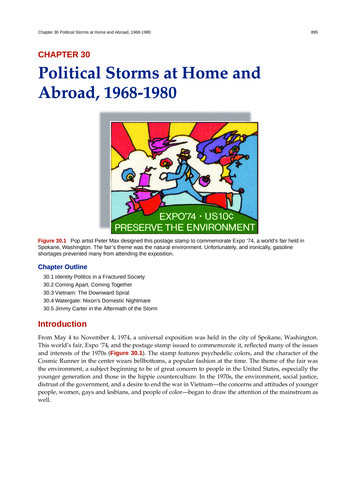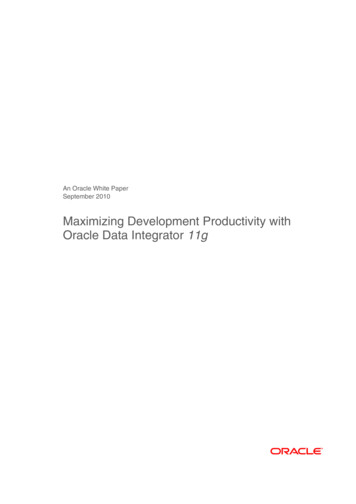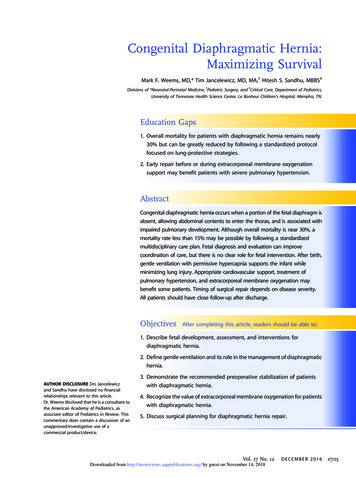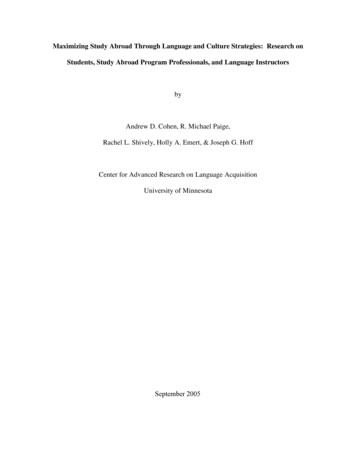
Transcription
Maximizing Study Abroad Through Language and Culture Strategies: Research onStudents, Study Abroad Program Professionals, and Language InstructorsbyAndrew D. Cohen, R. Michael Paige,Rachel L. Shively, Holly A. Emert, & Joseph G. HoffCenter for Advanced Research on Language AcquisitionUniversity of MinnesotaSeptember 2005
2
3Table of ContentsI.Credits and Acknowledgments7II.Background on the Research Team8-9III.Abstract10-14IV.Introduction to the Research Project and to the MaximizingStudy Abroad Guides15-20V.Review of the Literature21-34VI.Students’ Guide Study35-214(Lead Author: Rachel L. Shively)– Aims of the Study and Research Questions35-37– Research umentation43-53–Data Collection Procedures53-55–Data Analysis Procedures55-58– Findings and Interpretations for Research Questions #1-#859-182–Research Question #159-70–Research Question #271-75–Research Question #376-104–Research Question #4105-114–Research Question #5115-157–Research Question #6158-163–Research Question #7a164-173–Research Question #7b174–Research Question #8175-182– Findings for Revising the Students’ Guide (RQ #9)183-189– Mini Case Study of One E Group Student: “Erica”190-199– Summary of the Findings200-202– Limitations of the Study202-205– Discussion and Conclusions205-211– Direction for Future Research211-212
4– Suggestions for Teaching a Course for Study AbroadStudents Using the Students’ GuideVII.Program Professionals’ Guide Study(Lead Author: Joseph G. Hoff)213-214215-240– Aims of the Study and Research Questions215-216– Research Design216-220–Participants216-217–What the Program Professionals Were Asked to Do217-219–Instrumentation219-220–Data Collection Procedures220–Data Analysis Procedures220– Findings and Interpretations221-232– Findings for Revising the Program Professionals’ Guide232-235– Summary of the Findings236-237– Limitations of the Study237-238– Discussion238-239– Conclusions239– Directions for Future Research239-240VIII. Language Instructors’ Guide Study(Lead Author: Holly A. Emert)241-310– Aims of the Study and Research Questions241-242– Research Design242-250–Participants242-244–What the Language Instructors Were Asked to Do244-245–Instrumentation245-248–Data Collection Procedures248-250–Data Analysis Procedures250– Findings and Interpretations251-293– Findings for Revising the Language Instructors’ Guide294-298– Summary of the Findings299-302– Limitations of the Study302-303– Discussion303-308– Conclusions308
5– Directions for Future Research309IX.References for the Students’ Guide, Program Professionals’Guide, and Language Instructors’ Guide Studies311-320X.Appendices321-416a. Assignment Schedule of Reading in the Students’ Guidefor E Group Students While Studying Abroad321-322b. Background Questionnaire323-326c. Exit Language Contact Profile327-334d. Strategies Inventory for Learning Culture335-338e. Language Strategy Survey339-345f. Speech Act Measure346-385g. Follow-up Interview Protocol386h. Categories for Semantic Formula and Supportive MoveCoding of Speech Act Measure387-389i. Speech Act Measure French and Spanish Native SpeakerRating Criteria390-394j. Exit Questionnaire for Study Abroad Advisors395-399k. Exit Questionnaire for On-Site Directors400-404l. Monthly Questions for Language Instructor StudyParticipants405-406m. Exit Questionnaire for Language Instructors407-409n. Gillian’s Adaptation of ACT 19-21 Reading Strategy Use(Español 231: Exploración de temas culturales yestrategias de lectura)410-411o. Gillian’s Adaptation of DM 35 Exploring U.S. Culture(Español 231: Exploración de la cultura de EE.UU)412p. Elizabeth’s Activity: “Tell me who your friends are and I'lltell you who you are”413-414
6
7Credits and AcknowledgementsFirst, a word about authorship. Graduate assistants on this three-year project, RachelShively, Joe Hoff, and Holly Emert each took the lead in writing a section of the report, and forthat fine work, they are to be greatly acknowledged. Andrew Cohen and Michael Paigesupervised the writing of the report, and contributed sections to it. In addition, Cohen didextensive editing of it.The authors would like to express their thanks to a number of people who helped makethis study possible at various points during the three years (2002-2005) in which it was carriedout. First of all, the researchers would like to thank all of the research participants – the students,the study abroad professionals, and the language instructors – who, because of their dedication oftime and energy, made this study possible.The study benefited from the input of our IRSP research advisors – Barbara Freed(Carnegie Mellon University), Mitch Hammer (American University), and Bruce LaBrack(University of the Pacific). We thank them for their time and effort in helping us design thestudy and for holding us to high standards of excellence. In addition to the research advisors, wewould like to recognize and thank Margaret Meagher for her well-informed and helpful adviceand aide in designing and carrying out the language instructors’ study and for her consultingwork with the participating instructors.A number of individuals assisted us with the participant recruitment, the data collection,and the data analysis phases of the research. We would like to thank the following study abroadadvisors and the staff in their offices who assisted us in recruiting students for the research study:staff at the Learning Abroad Center at the University of Minnesota, especially Al Balkcum, AnnHubbard at the University of St. Thomas, Katherine Yngve at Macalester College, HelenaKaufmann at Carleton College, Elaine Carter and Phyllis Van Buren at St. Cloud StateUniversity, Jo Beld and Patrick Quade at St. Olaf, and Vera Wenzel at the College of St.Catherine. Susan McMillan-Villar (University of Minnesota) and Patricia Mougel’s (Universityof Minnesota) help with recruiting students for the validation of the strategies inventories andwith finding Spanish and French native speakers for the pilot testing and rating of the Speech ActMeasure was greatly appreciated. We also extend our thanks to Takuya Yoshida at NagoyaUniversity for his work on the factor analysis of the two strategies inventories, and to the fournative speakers of Spanish and two native speakers of French who did the taxing work of ratingthe pragmatic appropriateness of the hundreds of Speech Act Measure vignettes.In addition, we would like to express our appreciation to all of the staff at CARLA fortheir assistance in many aspects of this project. In particular, we would like to thank MarleneJohnshoy for her work creating the research website and making online data collection possible,and Karin Larson, for her assistance with many aspects of the project, including theadministration and organization of the study, and the recruitment of participants.Finally, in addition to all of the people who contributed to this research, we would like toacknowledge the granting agency, the International Research and Studies Program (IRSP) at theU.S. Department of Education, for providing financial support for this study.
8Background on the Research TeamCo-Principle InvestigatorsAndrew D. CohenAndrew D. Cohen is currently professor of applied linguistics in the English as a SecondLanguage Department at the University of Minnesota, Minneapolis, where he received theScholar of the College award for 2002-2005. With regard to his own experiences abroad, Cohenwas an Experimenter in International Living to Bordeaux, France (summer of 1961), then aPeace Corps Volunteer in rural community development with the Aymara Indians on the HighPlains of Bolivia (1965-67), and after teaching in the ESL Section of the English Department atthe University of California, Los Angeles (1972-1975), he spent 17 years as a professor at theSchool of Education, Hebrew University of Jerusalem, Israel. He has studied eleven foreignlanguages and keeps up seven. He has published articles on the learning, teaching, andassessment of a second language, on research methods, and on speech acts in pragmatics. Hisbooks include authored and edited volumes on bilingual education, language learning strategies,language assessment, and research methods. His latest book is a co-edited volume with DianaBoxer, Studying speaking to inform second language learning (Multilingual Matters, 2004).During the 2004-2005 academic year he was Visiting Professor at the Department of AppliedLanguage Studies & Linguistics, University of Auckland, New Zealand.R. Michael PaigeDr. R. Michael Paige is Professor of International and Intercultural Education and Chair of theDepartment of Educational Policy and Administration (EdPA) at the University of Minnesota,Minneapolis. Michael has worked as a professional international/intercultural educator for over35 years in the private and public sectors, beginning with his service as a U.S. Peace CorpsVolunteer English Teacher in Turkey (1965-1967). He has extensive experience as anintercultural trainer and training consultant having worked with Fortune 500 companies,universities in the U.S. and abroad, non-profit/community organizations, ministries of education,and public school districts. Over the course of his career, he has lived and worked in Turkey,Indonesia, Thailand, Philippines, Kenya, Hong Kong, Japan, and Australia. He was a SeniorFulbright Scholar at Kenyatta University in Nairobi, Kenya (1993-94), Visiting Professor atNagoya University (2003-04), and Visiting Research Professor at the University of SouthAustralia (2004). He is a certified IDI trainer/administrator and has also been on the faculty ofthe Summer Institute for Intercultural Communication since 1979. For the previous six years, hedirected the Culture and Language Project under the auspices of the Center for AdvancedResearch on Language Acquisition (CARLA), which focused on how culture can be taught andhow intercultural competence can be facilitated in second language courses at home and abroad.Michael has also edited Education for the Intercultural Experience (1993) and is the co-editorwith Dale Lange of the newly released volume, Culture as the core: Perspectives on culture insecond language learning (2003).
9Research AssistantsHolly A. EmertHolly has extensive experience as a foreign language educator (French, Spanish, English as aForeign Language) and as an intercultural trainer both within the U.S. and abroad. Her teachingexperience spans a period of over ten years at all levels K-16 (focusing on high school) andincludes experience teaching English as a Foreign Language for one year each in the People’sRepublic of China and in France via the Fulbright Teacher Exchange Program. Her interculturaltraining work includes trainings in education, government, and other contexts, with particularemphasis on the Developmental Model of Intercultural Sensitivity and the InterculturalDevelopment Inventory (Hammer & Bennett, 2001). Holly is a certified IDI consultant. Inaddition to her work as an intercultural consultant, she is currently at the dissertation stage of herdoctoral work in Comparative and International Development Education (CIDE) at theUniversity of Minnesota, specializing in International and Intercultural Education. She holds aB.A. in French and International Relations as well as a MA in CIDE with a Human ResourceDevelopment Certificate.Joseph G. HoffJoseph Hoff has over 18 years of experience in the international education field that includes theAssistant Directorship of Brown University’s Office of International Programs. A study abroadstudent in Spain during his junior year in college, he has also taught English in Japan, interned ata small college in Switzerland and volunteered in Tanzania with extensive travel in Asia, Europeand Latin America. Joe is a certified IDI consultant. He recently received his Ph.D. from theComparative and International Development Education (CIDE) program in the EducationalPolicy and Administration Department at the University of Minnesota. He holds an M.A. inInternational Administration from the School for International Training and a B.A. and a M.A. inSpanish from Saint Louis University.Rachel L. ShivelyRachel’s interest in study and travel abroad began with her own experience as a student in ayear-long study abroad program in The Netherlands (1997-98). Then in 2001, she spent eightmonths living, working, and learning language and culture in Guatemala and Nicaragua. Sincethat time, she has also had the opportunity to travel and volunteer for shorter periods of time inseveral other countries in Africa, Latin America, and Europe. Rachel has taught English as aSecond Language and Spanish as a Foreign Language courses in the U.S., and is currentlypursuing a Ph.D. in Hispanic Linguistics at the University of Minnesota, with a focus onpragmatics and second language acquisition. She has a B.A. in Anthropology from theUniversity of Arizona, Master’s degrees in Adult Education and Hispanic Linguistics, and inaddition to Spanish, she has studied Dutch, French, and Portuguese.
10AbstractThis report describes three research studies conducted at the University of Minnesotafocusing on students, study abroad program professionals, and language instructors. Theoverarching goal of the three studies combined was to field test the Maximizing Study Abroadseries of three guidebooks for students, program professionals, and language instructors.Students’ Guide StudyThe Students’ Guide study was designed to field test the Students’ Guide and to explorethe impact of a curricular intervention on study abroad students’ second language acquisition,intercultural development, language learning strategies, and culture learning strategies. Thestudy utilized an experimental design in which the sample of undergraduate university students(N 86) was randomly assigned to the treatment/experimental (E) group (N 42) or the control(C) group (N 44). The students who participated in th
Andrew D. Cohen, R. Michael Paige, Rachel L. Shively, Holly A. Emert, & Joseph G. Hoff Center for Advanced Research on Language Acquisition University of Minnesota September 2005. 2 . 3 Table of Contents I. Credits and Acknowledgments 7 II. Background on the Research Team 8-9 III. Abstract 10-14 IV. Introduction to the Research Project and to the Maximizing Study Abroad Guides 15-20 V. Review .

